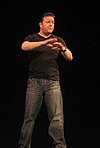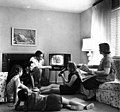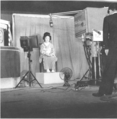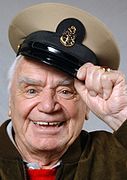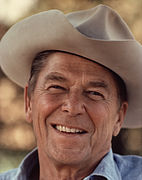Portal:Television
Portal maintenance status: (July 2018)
|
The Television Portal

Television (TV) is a telecommunication medium for transmitting moving images and sound. Additionally, the term can refer to a physical television set, rather than the medium of transmission. Television is a mass medium for advertising, entertainment, news, and sports. The medium is capable of more than "radio broadcasting", which refers to an audio signal sent to radio receivers.
Television became available in crude experimental forms in the 1920s, but only after several years of further development was the new technology marketed to consumers. After World War II, an improved form of black-and-white television broadcasting became popular in the United Kingdom and the United States, and television sets became commonplace in homes, businesses, and institutions. During the 1950s, television was the primary medium for influencing public opinion. In the mid-1960s, color broadcasting was introduced in the U.S. and most other developed countries.
In 2013, 79% of the world's households owned a television set. The replacement of earlier cathode-ray tube (CRT) screen displays with compact, energy-efficient, flat-panel alternative technologies such as LCDs (both fluorescent-backlit and LED), OLED displays, and plasma displays was a hardware revolution that began with computer monitors in the late 1990s. Most television sets sold in the 2000s were flat-panel, mainly LEDs. Major manufacturers announced the discontinuation of CRT, Digital Light Processing (DLP), plasma, and even fluorescent-backlit LCDs by the mid-2010s. LEDs are being gradually replaced by OLEDs. Also, major manufacturers have started increasingly producing smart TVs in the mid-2010s. Smart TVs with integrated Internet and Web 2.0 functions became the dominant form of television by the late 2010s. (Full article...)
Selected article - show another
Selected image - show another

| Credit: Wittylama |
A television studio is an installation in which television or video productions take place, either for live television, for recording live to tape, or for the acquisition of raw footage for postproduction. The design of a studio is similar to, and derived from, movie studios, with a few amendments for the special requirements of television production.
Did you know (auto-generated) - load new batch

- ... that a television in the film Day of Reckoning includes scenes from Big Ass Spider!?
- ... that Toshiki Seto was cast in the television adaptation of Senpai, This Can't Be Love! because, according to the creator, he could express emotion through his stare?
- ... that Indian historian R. Champakalakshmi was a script consultant for Bharat Ek Khoj, a television series based on Jawaharlal Nehru's The Discovery of India?
- ... that the day employees of Boston television station WLVI received new business cards, they learned the station would be sold and they would lose their jobs?
- ... that Phoenix radio station KTAR bought television station KTYL-TV to avoid a conflict with former U.S. senator Ernest McFarland?
- ... that the 2017 acquisition of Katz Broadcasting by the E. W. Scripps Company was seen as a validation of the business of diginets?
Selected quote - show another
| There were two keys to the show [Seinfeld]. Our sense of humor is combustible together. There was no idea he [ Larry David ] would have that I couldn’t immediately get onto and say, ‘Yeah, then we’ll do that and then we’ll do that.’ We’re very combustible together. The other thing, equally as important to me, absolutely, if not more important, is we shared a relentless work ethic, both of us. |
More did you know
- ...that the book The Psychology of The Simpsons uses this TV series to analyze topics in psychology including clinical psychology, cognition and Pavlovian conditioning?
- ...that the 1994 Guinness television advertisement Anticipation used jump cutting techniques to make an actor appear to be performing a physically impossible dance?
- ...that the ABC television network created controversy when they licensed and produced a doll based on fictional rapist Todd Manning?
- ...that Olivia Newton-John made at least 16 appearances on The Go!! Show, an Australian popular music television series which aired between 1964 to 1967, before she found international success?
- ...that a Spokane, Washington, television station devoted the first 11 minutes of its Saturday evening newscast to the February 2007 arrests of Gonzaga University basketball player Josh Heytvelt and his teammate?
Selected biography - show another
Kylie Ann Minogue AO OBE (/mɪˈnoʊɡ/; born 28 May 1968) is an Australian singer and actress. She is the highest-selling female recording artist from Australia, having sold over 80 million records worldwide. She has been recognised for reinventing herself in music as well as fashion, and is referred to by the European press as the "Princess of Pop" and a style icon. Her accolades include two Grammy Awards, four Brit Awards and eighteen ARIA Music Awards. In 2024, Time named her one of the most influential people in the world.
Born and raised in Melbourne, Minogue first achieved recognition starring as Charlene Robinson in the Australian soap opera Neighbours (1986–1988). She began her music career in the late 1980s, releasing four bubblegum and dance-pop-influenced studio albums under PWL. By the early 1990s, Minogue had amassed several top ten singles in Australia and the UK, including "The Loco-Motion", "I Should Be So Lucky", "Especially for You", "Hand on Your Heart" and "Better the Devil You Know". Taking more creative control over her music, she signed with Deconstruction Records in 1993 and released the albums Kylie Minogue (1994) and Impossible Princess (1997). (Full article...)General images
-
Image 1Philo Farnsworth in 1924 (from History of television)
-
Image 2Samsung's discontinued Orsay platform (from Smart TV)
-
Image 3The Nipkow disk. This schematic shows the circular paths traced by the holes, which may also be square for greater precision. The area of the disk outlined in black shows the region scanned. (from History of television)
-
Image 4RCA CT-100 at the SPARK Museum of Electrical Invention playing Superman. The RCA CT-100 was the first mass-produced color TV set. (from Color television)
-
Image 6Ad for the beginning of experimental television broadcasting in New York City by RCA in 1939 (from History of television)
-
Image 7The Philco Predicta, 1958. In the collection of The Children's Museum of Indianapolis (from History of television)
-
Image 9Smart TVs on display (from Smart TV)
-
Image 10LG Smart TV using the Web browser (from Smart TV)
-
Image 12Family watching TV, 1958 (from History of television)
-
Image 13The first mass-produced Czechoslovak TV-set Tesla 4001A (1953–57) (from History of television)
-
Image 14This live image of actress Paddy Naismith was used to demonstrate Telechrome, John Logie Baird's first all-electronic color television system, which used two projection CRTs. The two-color image would be similar to the basic Telechrome system. (from Color television)
-
Image 15LG Electronics smart TV from 2011 (from Smart TV)
-
Image 16Baird in 1925 with his televisor equipment and dummies "James" and "Stooky Bill" (right). (from History of television)
-
Image 17Public television in France uses 819 line b&w high definition, from 1959 until 1983 (TF1). (from History of television)
-
Image 18First television test broadcast transmitted by the NHK Broadcasting Technology Research Institute in May 1939 (from History of television)
-
Image 19DBS satellite dishes. (from History of television)
-
Image 20A color television test at the Mount Kaukau transmitter site, New Zealand in 1970.
A test pattern with color bars is used to calibrate the signal. (from Color television) -
Image 21Color bars used in a test pattern, sometimes used when no program material is available. (from History of television)
-
Image 22RCA 630-TS, the first mass-produced television set, which sold in 1946–1947 (from History of television)
-
Image 24Comparison of image quality between ISDB-T (1080i broadcast, top) and NTSC (480i transmission, bottom) (from Digital television)
-
Image 25An early Smart TV from 2012 running the discontinued Orsay platform (from History of television)
 Featured lists - load new batch
Featured lists - load new batch
-
Image 1The anime series Buso Renkin is based on the manga series of the same name written by Nobuhiro Watsuki. The series is directed by Takao Kato and produced by Xebec. The episodes follow Kazuki Muto who becomes an Alchemic warrior in the battle against Alchemic monsters known as Homunculi.
The production of the Buso Renkin anime was announced by the release of a minute-long internet trailer. Buso Renkin aired between October 5, 2006, and March 29, 2007, on TV Tokyo. The episodes were later released in nine DVD compilations between January 25, 2007, and September 21, 2007 by Geneon Universal Entertainment. A DVD box set containing the whole series was released on November 26, 2009. (Full article...) -
Image 2

Millennium is an American crime-thriller television series which was broadcast between 1996 and 1999. Created by Chris Carter, the series aired on Fox for three seasons with a total of sixty-seven episodes. Millennium starred Lance Henriksen, Megan Gallagher, Klea Scott, and Brittany Tiplady. Henriksen portrayed Frank Black, an offender profiler who worked for the Millennium Group, a private investigative organisation. Black retired from the Federal Bureau of Investigation to move his wife (Gallagher) and daughter (Tiplady) to Seattle, where he began to consult on criminal cases for the Group. After his wife's death, he returned to the FBI to work with new partner Emma Hollis (Scott) to discredit the Group.
Millennium's genesis stemmed from "Irresistible", a second-season episode of The X-Files penned by Carter. Influence was also drawn from the works of Nostradamus, and the increasing popular interest in eschatology ahead of the coming millennium. The series began airing in the Friday timeslot formerly occupied by The X-Files. "Pilot", the debut episode, was heavily promoted by Fox, and brought in over a quarter of the total audience during its broadcast. (Full article...) -
Image 3

The Flash is an American superhero television series developed for The CW by Greg Berlanti, Andrew Kreisberg, and Geoff Johns, based on the DC Comics character Barry Allen / Flash. It is set in the Arrowverse, sharing continuity with the other television series of the franchise, and is a spin-off of Arrow. The series premiered on October 7, 2014, and has been renewed through its seventh season. Grant Gustin stars as Barry, a crime scene investigator who gains superhuman speed, which he uses to fight criminals, including others who have also gained superhuman abilities.
The series has been a candidate for television awards in a variety of categories recognizing its writing, acting, directing, production, score, and visual effects. The Flash has been nominated for many awards, including six BMI Film, TV & Visual Media Awards (won all), two Hollywood Post Alliance Awards, one Hugo Award, seventeen IGN Awards (winning four), eleven Kids' Choice Awards, eighteen Leo Awards (winning seven), two MTV Movie & TV Awards, five People's Choice Awards (winning one), one Primetime Emmy Award, twenty-three Saturn Awards (winning seven), one TCA Award, twenty-seven Teen Choice Awards (winning six), one TV Guide Award (won), and one Visual Effects Society Award. Gustin is the most decorated of the show's cast, with thirty nominations and seven wins. The show also holds the world records for "Most in-demand superhero TV show" and "Most in-demand action and adventure TV show" from the Guinness World Records. (Full article...) -
Image 4
'"`UNIQ--templatestyles-00000016-QINU`"'
(Full article...)Image 5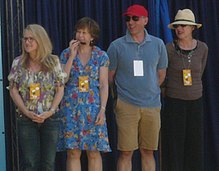
Four of the six main cast members attend a ceremony in 2009, left to right; Nancy Cartwright (Bart), Yeardley Smith (Lisa), Dan Castellaneta (Homer) and Julie Kavner (Marge).
The Simpsons is an American animated sitcom that includes six main voice actors and numerous regular cast and recurring guest stars. The principal cast consists of Dan Castellaneta, Julie Kavner, Nancy Cartwright, Yeardley Smith, Hank Azaria and Harry Shearer. Pamela Hayden, Tress MacNeille, Maggie Roswell, Chris Edgerly, Eric Lopez, Alex Désert, Kevin Michael Richardson, Jenny Yokobori, Kimberly D. Brooks, Dawnn Lewis, Tony Rodriguez, Melanie Minichino, Jonathan Lipow, and Grey DeLisle have appeared as supporting cast members, along with former supporting cast members Russi Taylor, Karl Wiedergott, Marcia Mitzman Gaven, Doris Grau, Susan Blu, Jo Ann Harris, and Christopher Collins. Repeat guest cast members include Marcia Wallace, Phil Hartman, Jon Lovitz, Joe Mantegna, Frank Welker, Kelsey Grammer and Albert Brooks. With the exception of "Old Money", episode credits list only the voice actors, and not the characters they voice.
Both Fox and the production crew wanted to keep their identities secret during the early seasons and closed most of the recording sessions while refusing to publish photos of the recording artists. The network eventually revealed which roles each actor performed in the episode "Old Money", because the producers said the voice actors should receive credit for their work. Every main cast member has won an Emmy for Outstanding Voice-Over Performance. Shearer was the last cast member to win, receiving his award in 2014 for the episode "Four Regrettings and a Funeral." Castellaneta and Azaria have won four, while Kavner, Cartwright, Smith, Shearer, Wallace, Grammer, and guest star Jackie Mason have each won one. (Full article...)Image 6The Cecil B. DeMille Award is an honorary Golden Globe Award bestowed by the Hollywood Foreign Press Association (HFPA) for "outstanding contributions to the world of entertainment". The HFPA board of directors selects the honorees from a variety of actors, directors, writers and producers who have made a significant mark in the film industry. It was first presented at the 9th Golden Globe Awards ceremony in February 1952 and is named in honor of its first recipient, director Cecil B. DeMille. The HFPA chose DeMille due to his prestige in the industry and his "internationally recognized and respected name". DeMille received the award the year his penultimate film, The Greatest Show on Earth, premiered. A year later in 1953, the award was presented to producer Walt Disney.
The award has been presented annually since 1952, with exceptions being 1976, 2008, 2022, and 2024. The second incident was due to the 2007–08 Writers Guild of America strike's cancellation of that year's ceremony. The award that year was meant to honor director Steven Spielberg, but due to the cancellation of the ceremony, the award was presented to him the following year. The third occurrence resulted from various media companies, actors, and other creatives boycotting the awards in protest over its lack of action to increase the membership diversity of the HFPA. In 2024, the award was shelved to make way for additional categories at that year's ceremony. (Full article...)Image 7
(Full article...)Image 8The Daytime Emmy Award for Outstanding Younger Actress in a Drama Series was an award presented annually by the National Academy of Television Arts and Sciences (NATAS) and the Academy of Television Arts & Sciences (ATAS). It was given annually from 1985 to 2019 to honor a young actress below the age of 25, who had delivered an outstanding performance in a role while working within the daytime drama industry.
At the 12th Daytime Emmy Awards held in 1985, Tracey E. Bregman was the first winner of this award, for her role of Lauren Fenmore on The Young and the Restless. The awards ceremony had not been aired on television for the prior two years, having been criticized for voting integrity. The award was originally called Outstanding Ingenue in a Drama Series, the criteria of the new category were deemed confusing, performers of differing ages were nominated, and critics argued some were of supporting or lead actress standards. Adding to the confusion, the first winner, Bregman, and the Outstanding Supporting Actress winner that year, Beth Maitland, played characters near to the same age. The category was re-named Outstanding Juvenile Female in a Drama Series in 1989, and began using its current title in 1991. The criteria were later altered, requiring that the actress be aged 25 or below. (Full article...)Image 9
Roberts at the 2018 Toronto International Film Festival
Julia Roberts is an American actress and producer who made her debut in the 1987 direct-to-video feature Firehouse. She had her breakthrough the following year by starring in the coming-of-age film Mystic Pizza (1988). For her supporting role in the comedy-drama Steel Magnolias (1989), she won the Golden Globe Award for Best Supporting Actress. Roberts' next role was opposite Richard Gere in the highly successful romantic comedy Pretty Woman (1990), for which she won the Golden Globe Award for Best Actress – Musical or Comedy. In 1991, she appeared in the psychological thriller Sleeping with the Enemy, and played Tinker Bell in the Steven Spielberg-directed fantasy adventure Hook. Two years later, Roberts starred in the legal thriller The Pelican Brief, an adaptation of the John Grisham novel of the same name. During the late 1990s, she played the lead in the romantic comedies My Best Friend's Wedding (1997), Notting Hill (1999), and Runaway Bride (1999).
In 2000, Roberts became the first actress to earn $20 million, for playing the eponymous environmental activist in the Steven Soderbergh-directed biographical film Erin Brockovich. Her performance won her the Academy Award for Best Actress, the BAFTA Award for Best Actress in a Leading Role, and the Golden Globe Award for Best Actress – Drama. The following year, she starred in the romantic comedy America's Sweethearts (2001), and reteamed with Soderbergh on the comedy heist remake Ocean's Eleven (2001). Roberts appeared in the 2003 drama, Mona Lisa Smile, which earned her a then record $25 million salary. The following year, she starred in the romantic drama Closer (2004), and also reprised her role in the sequel, Ocean's Twelve (2004). In 2006, she lent her voice to two animated films: The Ant Bully, and Charlotte's Web. Roberts went on to appear in the comedy-dramas Charlie Wilson's War (2007) and Eat Pray Love (2010), following which she starred in August: Osage County (2013), for which she was nominated for the Academy Award for Best Supporting Actress. In 2016, Roberts played a television producer in the thriller Money Monster and the following year, she played a mother coping with her son's Treacher Collins syndrome in the comedy-drama Wonder. (Full article...)Image 10Holby City is a British medical drama television series that was broadcast on BBC One in the United Kingdom between 12 January 1999 and 29 March 2022. The series was created by Tony McHale and Mal Young as a spin-off from the BBC medical drama Casualty, which is set in the emergency department of the fictional Holby City Hospital, based in the equally fictitious town of Holby. Young wanted to explore what happened to patients treated in Casualty once they were taken away to the hospital's surgical wards. He opined that Casualty limited itself to "accident of the week" storylines, while Holby City allowed the possibility of storylines about long-term care, rather than immediate life-and-death decisions.
Holby City has earned various awards and nominations, with the nominations in categories ranging from Best Drama to its writing and editing work to the cast's acting performance. It received nominations for eight awards from the British Academy of Film and Television Arts (BAFTAs), winning the Best Continuing Drama in the 2008 British Academy Television Awards — an award for which it was unsuccessfully nominated in for three years prior to winning and five years after winning. Despite being the most shortlisted Holby City actress, Amanda Mealing (who portrayed Connie Beauchamp) did not win any awards for her role. Jimmy Akingbola was the most acclaimed actor from the series, winning two awards for his role as Antoine Malick. Rebecca Wojciechowski and Peter Mattessi are the only members of the show's production team to win an accolade; they have each won a Writers' Guild of Great Britain award. The serial has also been nominated for 32 awards at the National Television Awards, although it never won. (Full article...)Image 11
The Mandalorian is an American space Western television series created by Jon Favreau for the streaming service Disney+. It is the first live-action series in the Star Wars franchise, beginning five years after the events of Return of the Jedi (1983). Pedro Pascal stars as the title character, a lone bounty hunter who goes on the run after being hired to retrieve "The Child". The first season premiered on Disney+ on its United States launch day, November 12, 2019, and the second season premiered on October 30, 2020.
The series received numerous awards and nominations for its acting, directing, writing, visual effects, and production values. Among these recognitions, it has been nominated for six Primetime Emmy Awards and forty-two Primetime Creative Arts Emmy Awards (winning fourteen Creative Arts Emmys). The series' first two seasons were nominated for Outstanding Drama Series. At the 2021 ceremony, it tied for most nominations with twenty-four, and it tied for most awards at the Creative Arts ceremony in 2020 with seven wins. Giancarlo Esposito, Timothy Olyphant, Taika Waititi, and Carl Weathers have received Emmy nominations for their performances. Episodes "Chapter 1: The Mandalorian", "Chapter 2: The Child", and "Chapter 16: The Rescue" each won two Emmy awards for their technical achievements. (Full article...)Image 12Bernard Lee (1908–1981) was an English actor who performed in many light entertainment media, including film, television and theatre. His career spanned from 1934 to 1981, although he made his first appearance on the stage at the age of six. He is perhaps best known for playing M in the first eleven Eon-produced James Bond films.
Lee trained at the Royal Academy of Dramatic Art, before making his professional stage debut in 1924. He appeared on film for the first time in 1934 in the Leslie Howard Gordon-directed comedy The Double Event, where he played the part of Dennison. Although he was in wartime service with the Royal Sussex Regiment between 1940 and 1946, he had already been in several films, which were released between 1939 and 1943. He returned to acting after the war and was offered a role in the play Stage Door while awaiting his demob. (Full article...)News
Wikinews television portal- December 28: US professional wrestler Jon Huber dies aged 41
- September 2: Tributes paid to recently deceased US actor Chadwick Boseman
- May 24: Japanese professional wrestler and Netflix star Hana Kimura dies aged 22
- January 16: BBC newsreader Alagiah to undergo treatment for bowel cancer
- Upcoming events
Featured content
No.
overallNo. in
seasonTitle Directed by Written by Original air date Prod.
codeU.S. viewers
(millions)1 1 "Death Has a Shadow" Peter Shin Seth MacFarlane January 31, 1999 (1999-01-31) 1ACX01 22.00 2 2 "I Never Met the Dead Man" Michael Dante DiMartino Chris Sheridan April 11, 1999 (1999-04-11) 1ACX02 14.50 3 3 "Chitty Chitty Death Bang" Dominic Polcino Danny Smith April 18, 1999 (1999-04-18) 1ACX04 13.78 4 4 "Mind Over Murder" Roy Allen Smith Neil Goldman & Garrett Donovan April 25, 1999 (1999-04-25) 1ACX03 11.69 5 5 "A Hero Sits Next Door" Monte Young Mike Barker & Matt Weitzman May 2, 1999 (1999-05-02) 1ACX05 12.61 6 6 "The Son Also Draws" Neil Affleck Ricky Blitt May 9, 1999 (1999-05-09) 1ACX06 11.20 7 7 "Brian: Portrait of a Dog" Michael Dante DiMartino Gary Janetti May 16, 1999 (1999-05-16) 1ACX07 13.10 42 1 "Yoruichi, Goddess of Flash, Dances!"
Transliteration: "Shunjin Yoruichi, Mau!" (Japanese: 瞬神夜一、舞う!)Jun'ya Koshiba Akira Iwanaga Michiko Yokote July 26, 2005 (2005-07-26) July 21, 2007 43 2 "The Despicable Shinigami"
Transliteration: "Hiretsu na Shinigami" (Japanese: 卑劣な死神)Motosuke Takahashi Jun'ya Koshiba Michiko Yokote August 2, 2005 (2005-08-02) July 28, 2007 44 3 "Ishida Ultimate Power!"
Transliteration: "Ishida, Kyokugen no Chikara!" (Japanese: 石田、極限の力!)Satoshi Nishimura Kazunori Mizuno Masashi Sogo August 9, 2005 (2005-08-09) August 4, 2007 45 4 "Overcome Your Limits!"
Transliteration: "Genkai o Koero!" (Japanese: 限界を越えろ!)Tetsuhito Saitō Kazunobu Shimizu Genki Yoshimura August 16, 2005 (2005-08-16) August 11, 2007 46 5 "Authentic Records! School of Shinigami"
Transliteration: "Jitsuroku! Shinigami no Gakkō" (Japanese: 実録!死神の学校)Kōji Aritomi Kōji Aritomi Masahiro Ōkubo August 23, 2005 (2005-08-23) August 18, 2007 47 6 "The Avengers"
Transliteration: "Adautsu Mono-tachi" (Japanese: 仇討つ者たち)Masami Shimoda Mitsutaka Noshitani Natsuko Takahashi August 30, 2005 (2005-08-30) September 1, 2007 48 7 "Hitsugaya Roars!"
Transliteration: "Hitsugaya, Hoeru!" (Japanese: 日番谷、吼える!)Jun'ya Koshiba Jun'ya Koshiba Rika Nakase September 6, 2005 (2005-09-06) September 8, 2007 49 8 "Rukia's Nightmare"
Transliteration: "Rukia no Akumu" (Japanese: ルキアの悪夢)Tetsuhito Saitō Hodaka Kuramoto Masahiro Ōkubo September 13, 2005 (2005-09-13) September 15, 2007 50 9 "The Reviving Lion"
Transliteration: "Yomigaeru Shishi" (Japanese: よみがえる獅子)Shin'ichi Watanabe Shigeki Hatakeyama Michiko Yokote September 20, 2005 (2005-09-20) September 22, 2007 51 10 "Morning of the Sentence"
Transliteration: "Shokei no Asa" (Japanese: 処刑の朝)Jun'ya Koshiba Yoshinori Odaka Genki Yoshimura September 27, 2005 (2005-09-27) October 6, 2007 52 11 "Renji, Oath of the Soul! Death Match with Byakuya"
Transliteration: "Renji, Tamashii no Chikai! Byakuya to no Shitō" (Japanese: 恋次、魂の誓い!白哉との死闘)Kōji Aritomi Kōji Aritomi Masashi Sogo October 4, 2005 (2005-10-04) October 13, 2007 53 12 "Gin Ichimaru's Temptation, Resolution Shattered"
Transliteration: "Ichimaru Gin no Yūwaku, Kuzusareta Kakugo" (Japanese: 市丸ギンの誘惑、崩された覚悟)Akio Kawamura Akira Shimizu Natsuko Takahashi October 4, 2005 (2005-10-04) March 2, 2008 54 13 "An Accomplished Oath! Get back Rukia!"
Transliteration: "Hatasareru Chikai! Rukia Dakkan Naruka!" (Japanese: 果たされる誓い!ルキア奪還なるか)Tetsuhito Saitō Kazunori Mizuno Rika Nakase October 18, 2005 (2005-10-18) March 9, 2008 55 14 "The Strongest Shinigami! Ultimate Confrontation Between Teacher and Students"
Transliteration: "Saikyō no Shinigami! Kyūkyoku no Shitei Taiketsu" (Japanese: 最強の死神!究極の師弟対決)Jun'ya Koshiba Mitsutaka Noshitani Masashi Sogo October 25, 2005 (2005-10-25) March 16, 2008 56 15 "Supersonic Battle! Determine the Goddess of Battle"
Transliteration: "Chōsoku no Tatakai! Bu no Megami, Kessu" (Japanese: 超速の戦い!武の女神、決す)Tetsuya Endō Hodaka Kuramoto Genki Yoshimura November 1, 2005 (2005-11-01) March 23, 2008 57 16 "Senbonzakura, Crushed! Zangetsu Thrusts through the Sky"
Transliteration: "Senbonzakura, Funsai! Ten o Tsuku Zangetsu" (Japanese: 千本桜、粉砕!天を衝く斬月)Motosuke Takahashi Jun'ya Koshiba Rika Nakase November 8, 2005 (2005-11-08) March 30, 2008 58 17 "Unseal! The Black Blade, the Miraculous Power"
Transliteration: "Kaihō! Kuroki Yaiba, Kiseki no Chikara" (Japanese: 開放!黒き刃、奇跡の力)Manabu Fukazawa Noriyuki Abe Masashi Sogo November 15, 2005 (2005-11-15) April 6, 2008 59 18 "Conclusion of the Death Match! White Pride and Black Desire"
Transliteration: "Shitō Ketchaku! Shiroki Hokori to Kuroki Omoi" (Japanese: 死闘決着!白き誇りと黒き想い)Jun'ya Koshiba Jun'ya Koshiba Masashi Sogo November 22, 2005 (2005-11-22) April 13, 2008 60 19 "Reality of the Despair, the Assassin's Dagger is Swung"
Transliteration: "Zetsubō no Shinjitsu, Furiorosareta Kyōjin" (Japanese: 絶望の真実、振り下ろされた凶刃)Akio Kawamura Kazunori Mizuno Genki Yoshimura December 6, 2005 (2005-12-06) April 20, 2008 61 20 "Aizen Stands! Horrible Ambitions"
Transliteration: "Aizen, Tatsu! Osorubeki Yabō" (Japanese: 藍染、立つ!恐るべき野望)Tetsuya Endō Akira Shimizu Masahiro Ōkubo December 13, 2005 (2005-12-13) April 27, 2008 62 21 "Gather Together! Group of the Strongest Shinigami!"
Transliteration: "Shūketsuseyo! Saikyō no Shinigami Shūdan" (Japanese: 集結せよ!最強の死神集団)Tetsuhito Saitō Hodaka Kuramoto Masashi Sogo December 20, 2005 (2005-12-20) May 4, 2008 63 22 "Rukia's Resolution, Ichigo's Feelings"
Transliteration: "Rukia no Ketsui, Ichigo no Omoi" (Japanese: ルキアの決意、一護の想い)Shigeki Hatakeyama Shigeki Hatakeyama Masashi Sogo January 10, 2006 (2006-01-10) May 11, 2008 Main topics
History of television: Early television stations • Geographical usage of television • Golden Age of Television • List of experimental television stations • List of years in television • Mechanical television • Social aspects of television • Television systems before 1940 • Timeline of the introduction of television in countries • Timeline of the introduction of color television in countries
Inventors and pioneers: John Logie Baird • Alan Blumlein • Walter Bruch • Alan Archibald Campbell-Swinton • Allen B. DuMont • Philo Taylor Farnsworth • Charles Francis Jenkins • Boris Grabovsky • Paul Gottlieb Nipkow • Constantin Perskyi • Boris Rosing • David Sarnoff • Kálmán Tihanyi • Vladimir Zworykin
Technology: Comparison of display technology • Digital television • Liquid crystal display television • Large-screen television technology • Technology of television
Terms: Broadcast television systems • Composite monitor • HDTV • Liquid crystal display television • PAL • Picture-in-picture • Pay-per-view • Plasma display • NICAM • NTSC • SECAM
Categories
WikiProjects

You are invited to participate in WikiProject Television, a WikiProject dedicated to developing and improving articles about Television.
- Main projects
- Sub-projects
Television Stations • American animation • American television • Australian television • British TV • BBC • Canadian TV shows • Television Game Shows • ITC Entertainment Productions • Digimon • Buffyverse • Doctor Who • Degrassi • EastEnders • Episode coverage • Firefly • Futurama • Grey's Anatomy • Indian television • Lost • Nickelodeon • The O.C. • Professional Wrestling • Reality TV • The Simpsons • Seinfeld • South Park • Stargate • Star Trek • Star Wars • Soap operas • Avatar: The Last Airbender • House
- Related projects
Animation • Anime and manga • Comedy • Comics • Fictional characters • Film • Media franchises
What are WikiProjects?
Things you can do

Things you can do - Place the {{WikiProject Television}} project banner on the talk pages of all articles within the scope of the project.
- Write: Possible Possum
- Cleanup: color television, Alien Nation: Body and Soul, The Sopranos, Alien Nation: Dark Horizon, Alien Nation: The Enemy Within, Alien Nation: Millennium, Aang
- Expand: Timeline of the introduction of color television in countries
- Stubs: Flow (television), Just for Kicks (TV series), Play of the Month, Nova (Dutch TV series), More stubs...
Subportals
Related portals
Associated Wikimedia
The following Wikimedia Foundation sister projects provide more on this subject:
-
Commons
Free media repository -
Wikibooks
Free textbooks and manuals -
Wikidata
Free knowledge base -
Wikinews
Free-content news -
Wikiquote
Collection of quotations -
Wikisource
Free-content library -
Wikiversity
Free learning tools -
Wiktionary
Dictionary and thesaurus
Discover Wikipedia using portals
- Portals with triaged subpages from July 2018
- All portals with triaged subpages
- Portals with no named maintainer
- Random portal component with over 50 available subpages
- Random portal component with 21–25 available image subpages
- Random portal component with 31–40 available subpages
- Automated article-slideshow portals with 201–500 articles in article list

